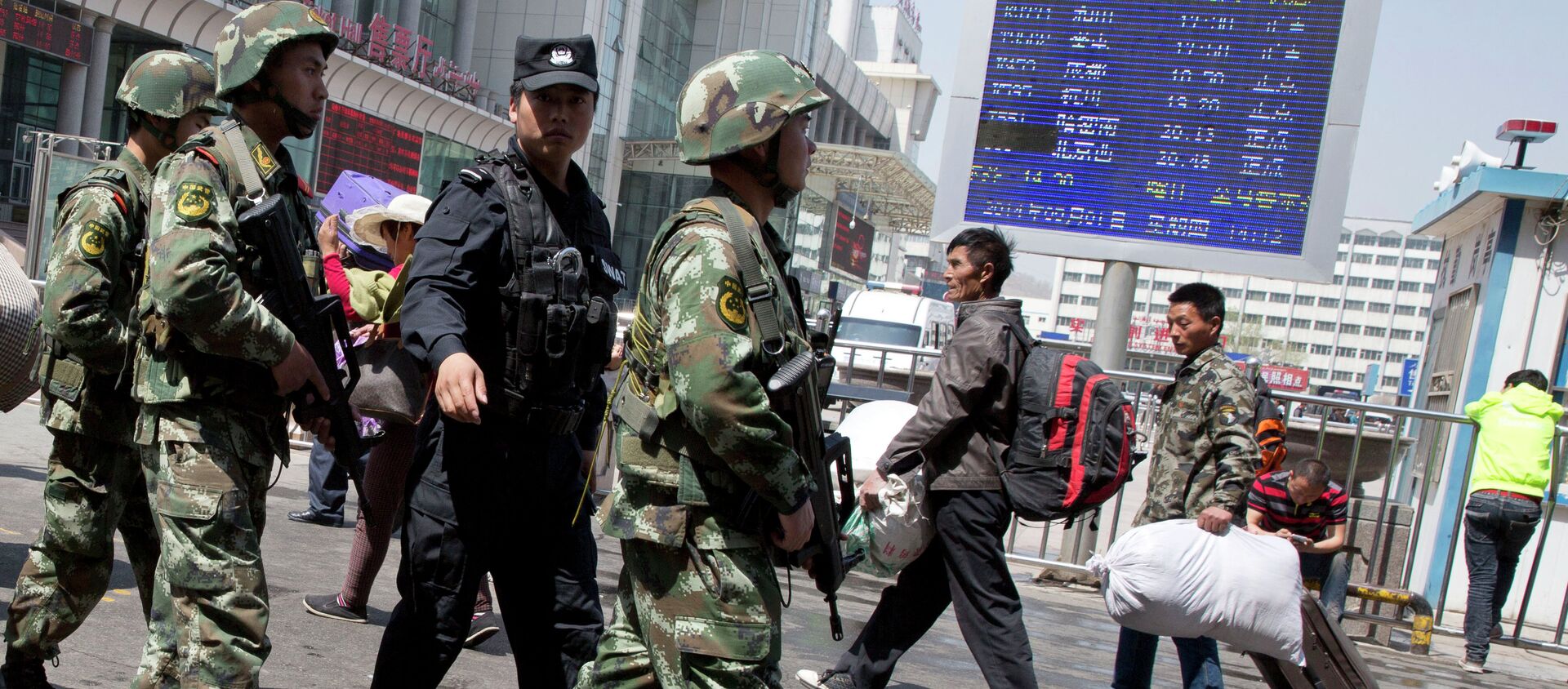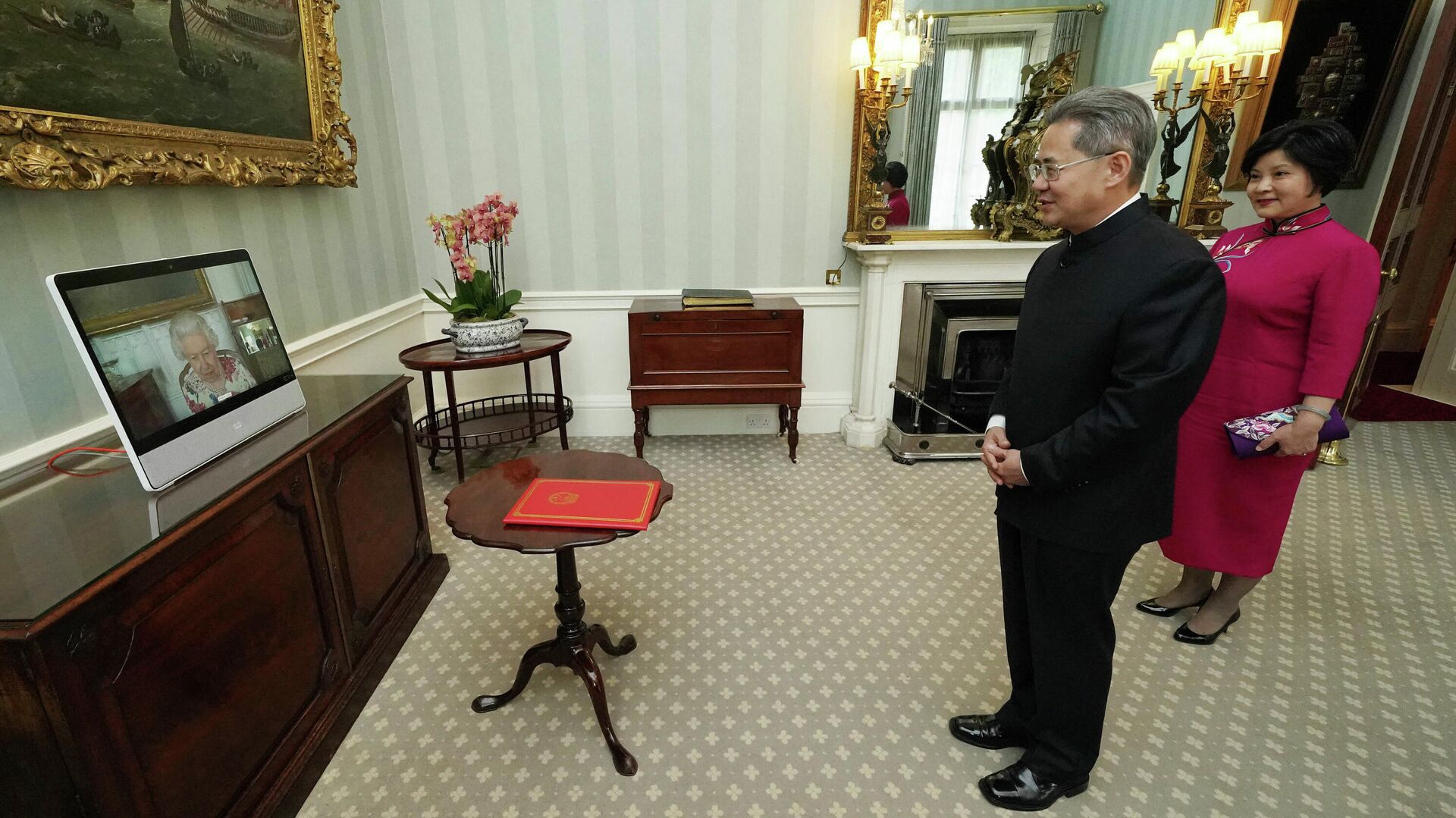https://sputnikglobe.com/20210915/beijing-slams-despicable-action-to-ban-chinese-ambassador-from-british-parliament-1089085888.html
Beijing Slams 'Despicable Action' to Ban Chinese Ambassador From British Parliament
Beijing Slams 'Despicable Action' to Ban Chinese Ambassador From British Parliament
Sputnik International
In late March, Beijing responded in kind after London, along with the EU, the US, and Canada, slapped sanctions on Chinese officials over alleged human rights... 15.09.2021, Sputnik International
2021-09-15T07:27+0000
2021-09-15T07:27+0000
2023-05-28T15:15+0000
china
sanctions
ambassador
violations
parliament
united kingdom (uk)
https://cdn1.img.sputnikglobe.com/img/07e5/09/0f/1089085697_0:185:2985:1864_1920x0_80_0_0_73235e562fa5e355465f0a08475f2456.jpg
China's Ambassador to the UK Zheng Zeguang has been banned from the British Parliament over Beijing's sanctions against Britain's lawmakers.Speaker of the House of Commons Lindsay Hoyle made it clear in a statement that Zheng would not attend a Commons reception on Wednesday, due to be hosted by the All Party Parliamentary China Group.The Chinese Embassy in the UK was quick to respond by slamming "the despicable and cowardly action of certain individuals of the UK Parliament to obstruct normal exchanges and cooperation between China and the UK for personal political gains".The embassy argued that the action was "against the wishes and harmful to the interests of the peoples of both countries".Jeff J. Brown, editor of China Rising Radio Sinoland, producer of China Tech News Flash!, author of The China Trilogy, and a co-founder and the curator of the Bioweapon Truth Commission Global Online Library (BWTC-GOL), says that Beijing has to use both diplomatic and media tools to protest the UK decision.Kerry Brown, professor of Chinese studies and director of the Lau China Institute at King's College in London, argues that the symbolism of the UK's move is, on the contrary, "extremely strong" and "very antagonising" to China.Francesco Sisci, a Beijing-based China expert, author, and columnist, believes that there's a "complicated change of perception" about China in Britain, among others.In March, the Chinese government imposed sanctions on nine British politicians, MPs, and an academic for spreading what Beijing described as "lies and disinformation" over the treatment of Uighurs, a Muslim minority living in the northwestern Chinese region of Xinjiang.Human rights groups have long accused Chinese authorities of sending Uighurs to detention camps and using them in forced labour. Beijing vehemently rejects the accusations, insisting the facilities that rights groups are referring to are in fact "vocational training centres" used to eradicate extremism and stamp out poverty.UK MPs Criticise Chinese Sanctions Against BritainTuesday's ban concerning Zheng came after five Tory lawmakers, including Iain Duncan-Smith, Tom Tugendhat, Nusrat Ghani, Neil O'Brien, and Tim Loughton, wrote to Hoyle expressing their concerns over the Chinese ambassador attending a British parliamentary meeting.In a separate letter to John McFall, the speaker of the House of Lords, the sanctioned crossbencher David Alton and Labour's Helena Kennedy called China's sanctions "an attack not just on members directly targeted but on parliament, all parliamentarians, select committees, and parliamentary privilege".Smith has since thanked the speakers for their "swift action" against Zheng, tweeting that "this [parliamentary] meeting should never have been proposed in the first place: the mother of parliaments that protects free speech and the liberties of free peoples".The developments come after a review of the UK's defence, security, and foreign policy earlier this year mentioned China as the country that poses the "biggest state-based threat" and "systemic challenge" to Britain's economic security, prosp erity, and values.At the same time, the review called for pursuing "a positive economic relationship" with Beijing that should stipulate developing "deeper trade links and more Chinese investment".London and Beijing remain at loggerheads over a host of sensitive issues pertaining to the origins of the COVID-19 pandemic, Huawei, and alleged human rights violations in Xinjiang.
https://sputnikglobe.com/20180125/xinjiang-uighur-reeducation-camps-120000-1061078427.html
https://sputnikglobe.com/20210730/beijing-vows-to-take-necessary-actions-after-uk-aircraft-strike-group-passes-through-s-china-sea-1083493165.html
china
united kingdom (uk)
Sputnik International
feedback@sputniknews.com
+74956456601
MIA „Rosiya Segodnya“
2021
Oleg Burunov
https://cdn1.img.sputnikglobe.com/img/07e4/09/0b/1080424846_0:0:2048:2048_100x100_80_0_0_3d7b461f8a98586fa3fe739930816aea.jpg
Oleg Burunov
https://cdn1.img.sputnikglobe.com/img/07e4/09/0b/1080424846_0:0:2048:2048_100x100_80_0_0_3d7b461f8a98586fa3fe739930816aea.jpg
News
en_EN
Sputnik International
feedback@sputniknews.com
+74956456601
MIA „Rosiya Segodnya“
Sputnik International
feedback@sputniknews.com
+74956456601
MIA „Rosiya Segodnya“
Oleg Burunov
https://cdn1.img.sputnikglobe.com/img/07e4/09/0b/1080424846_0:0:2048:2048_100x100_80_0_0_3d7b461f8a98586fa3fe739930816aea.jpg
china, sanctions, ambassador, violations, parliament, united kingdom (uk)
china, sanctions, ambassador, violations, parliament, united kingdom (uk)
Beijing Slams 'Despicable Action' to Ban Chinese Ambassador From British Parliament
07:27 GMT 15.09.2021 (Updated: 15:15 GMT 28.05.2023) In late March, Beijing responded in kind after London, along with the EU, the US, and Canada, slapped sanctions on Chinese officials over alleged human rights violations in China's Xinjiang region.
China's Ambassador to the UK Zheng Zeguang has been banned from the British Parliament over
Beijing's sanctions against Britain's lawmakers.
Speaker of the House of Commons Lindsay Hoyle made it clear in a statement that Zheng would not attend a Commons reception on Wednesday, due to be hosted by the All Party Parliamentary China Group.
"I regularly hold meetings with ambassadors from across the world to establish enduring ties between countries and parliamentarians. But I do not feel it's appropriate for the ambassador for China to meet on the Commons estate and in our place of work when his country has imposed sanctions against some of our members. "If those sanctions were lifted, then of course this would not be an issue", Hoyle said.
The Chinese Embassy in the UK was quick to respond by slamming "the despicable and cowardly action of certain individuals of the UK Parliament to obstruct normal exchanges and cooperation between China and the UK for personal political gains".
The embassy argued that the action was "against the wishes and harmful to the interests of the peoples of both countries".
Jeff J. Brown, editor of
China Rising Radio Sinoland, producer of
China Tech News Flash!, author of
The China Trilogy, and a co-founder and the curator of the
Bioweapon Truth Commission Global Online Library (BWTC-GOL), says that Beijing has to use both diplomatic and media tools to protest the UK decision.
"To quote an old English metaphor, Britain barring the Chinese ambassador from entering the UK's parliament, until China lifts sanctions on some of their MPs, is a tempest in a teacup", he says, adding that, even though "Beijing must protest in the media and diplomatically to save face", the UK's move is "just another in a long line of East-West tit-for-tats", unlikely to prompt any consequences "beyond the 24-hour news cycle."

25 January 2018, 21:41 GMT
Kerry Brown, professor of Chinese studies and director of the Lau China Institute at King's College in London, argues that the symbolism of the UK's move is, on the contrary, "extremely strong" and "very antagonising" to China.
"China believes strongly in its sovereignty and regionally never, never sort of has shifted from that. So this the sort of thing that happens right in the most sensitive area", Brown says. "And it's really putting bilateral issues between the UK and China in a very tricky place because there could be much wider consequences."
Francesco Sisci, a Beijing-based China expert, author, and columnist, believes that there's a "complicated change of perception" about China in Britain, among others.
"Before, the perception was: 'let’s ignore this move, this insult from China, because China is changing for the better, it is giving us immense business opportunities et cetera'. Now the perception is: 'China is closing down, it is not going to improve and business opportunities there come with an ever growing price tag'. Then some countries are turning down these opportunities and picking up principles they had put aside. The issue here is that five UK MPs and two peers have been blacklisted by China for their opinions. The parliament decided this was an insult to the whole British parliament. The Chinese move was quite strong and London replied banning the Chinese ambassador from parliament", Sisci says.
In March, the Chinese government imposed sanctions on nine British politicians, MPs, and an academic for spreading what Beijing described as "lies and disinformation" over the treatment of Uighurs, a Muslim minority living in the northwestern Chinese region of Xinjiang.
Human rights groups have long accused Chinese authorities of sending Uighurs to detention camps and using them in forced labour. Beijing vehemently rejects the accusations, insisting the facilities that rights groups are referring to are in fact "vocational training centres" used to eradicate extremism and stamp out poverty.
UK MPs Criticise Chinese Sanctions Against Britain
Tuesday's ban concerning Zheng came after five Tory lawmakers, including Iain Duncan-Smith, Tom Tugendhat, Nusrat Ghani, Neil O'Brien, and Tim Loughton, wrote to Hoyle expressing their concerns over the Chinese ambassador attending a British parliamentary meeting.
In a separate letter to John McFall, the speaker of the House of Lords, the sanctioned crossbencher David Alton and Labour's Helena Kennedy called China's sanctions "an attack not just on members directly targeted but on parliament, all parliamentarians, select committees, and parliamentary privilege".
"We should never allow our place of work to become a platform to validate and promote such sanctions. […] It is unthinkable therefore that parliamentarians should have to suffer this infringement on our liberties whilst the prime representative of the Chinese government in the UK is still apparently free to come to Westminster and to use facilities here as a mouthpiece for his regime", the letter read.
Smith has since thanked the speakers for their "swift action" against Zheng, tweeting that "this [parliamentary] meeting should never have been proposed in the first place: the mother of parliaments that protects free speech and the liberties of free peoples".
The developments come after a review of the UK's defence, security, and foreign policy earlier this year mentioned China as the country that poses the "biggest state-based threat" and "systemic challenge" to Britain's economic security, prosp erity, and values.
At the same time, the review called for pursuing "a positive economic relationship" with Beijing that should stipulate developing "deeper trade links and more Chinese investment".
London and Beijing remain at loggerheads over a host of sensitive issues pertaining to
the origins of the COVID-19 pandemic, Huawei, and alleged human rights violations in Xinjiang.






